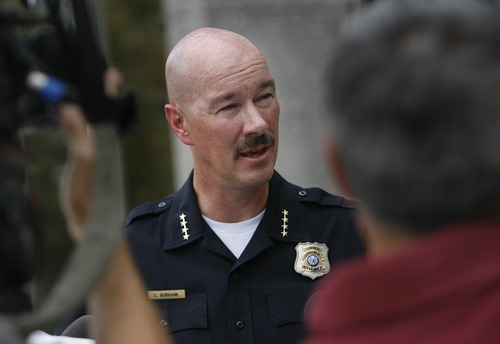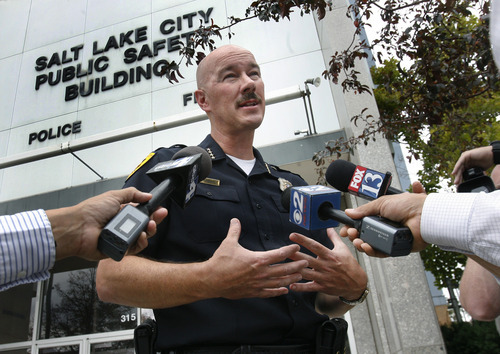This is an archived article that was published on sltrib.com in 2012, and information in the article may be outdated. It is provided only for personal research purposes and may not be reprinted.
The son of a man who died in police custody filed a civil lawsuit Thursday alleging Salt Lake City police caused his father's death by using a Taser on him in June, a claim that drew a swift rebuttal from the city's police chief.
Attorney Robert B. Sykes, who is representing Tyson Powers, said the complaint, filed in U.S. District Court, alleges police used excessive force when they detained Allen Keith Nelson on June 9, and that use of a Taser likely caused Nelson to die of cardiac arrest. The complaint also names Taser International Inc. as a defendant.
"The question here is about whether force, any force, was needed at all," Sykes said during a news conference at his office. "They are not supposed to use this as a tool of convenience."
But Salt Lake Police Chief Chris Burbank for the second time denied police used a Taser on Nelson. Burbank said investigators collected the officers' Tasers at the scene and checked their digital history. When a Taser is deployed, it creates a digital record and produces a tiny slip of paper with identifying marks that match the cartridge that was fired, Burbank said.
"We know every single time a Taser is used," Burbank said.
No digital record exists for either Taser at the time Nelson was with officers, and no paper markers were found at the scene, Burbank said Thursday. In a meeting with local pastors last month about the incident, Burbank also said a Taser was not used on Nelson.
But Nelson's family insists something went wrong that morning. In addition to his son, Nelson's brother, sister and nephew attended the press conference. They described Nelson as a happy, nonviolent person who had no known health problems and had talked about turning his life around.
Tyson Powers, 23, said Thursday he has made daily attempts to get police and autopsy reports to learn what happened to his father.
"Nobody deserves to go through what my family is going through, and all for what?" said Powers, who served with the Navy in the Persian Gulf and lives in San Diego, where he has just been accepted into the police academy. "I wake up every day with an emptiness in my heart and stomach not knowing what happened."
Nelson, who had an extensive criminal history, was released from the Salt Lake County jail on June 4 after serving about five months of a six-month sentence for misdemeanor convictions for theft, failure to obey a police command and assault on a police officer.
Darlene Bessonette said Thursday that Nelson came to an apartment complex at 717 S. Laconia Court (250 East) on June 8 to visit his uncle. Nelson's mother also lives in the building.
Bessonette, who lives in the complex, let Nelson into the building around 2 p.m. and his bicycle was still there when she returned three hours later. Bessonette, a 78-year-old retired nurse, said she got up around 3 a.m. to let her dogs out and heard someone exit the building through another entrance. Bessonette said moments later she saw a man she recognized as Nelson riding his bicycle toward 700 South. She also saw a police vehicle with lights flashing stop Nelson. Bessonette said she was concerned because Nelson had just been released from jail and went to see why he'd been stopped.
Police said in June that neighbors called to report Nelson was making a disturbance; Bessonette denied Thursday there was any disturbance at the complex. Sykes said the family believes Nelson was stopped because police thought he had stolen the bicycle.
According to the complaint and statements she made Thursday, as Bessonette walked up she heard Nelson crying out, "Please don't hit me again," and, "I didn't do it." Bessonette said during the press conference she heard one officer say, "I Tased him," and that the second officer replied, "You Tased him? Oh my God, he's not breathing."
Bessonette said neither officer attempted to revive Nelson.
"They was doing nothing," she said. "They acted like they didn't even care."
The court filing says that "upon information and belief" police used a Taser on Nelson at least once, "probably" in the chest area, and thus subjected him to "an unreasonably dangerous electrical current" that led to his difficulty breathing and a cardiac arrest. By the time an ambulance arrived, Nelson was dead.
Bessonette said the officers were unaware she had watched the incident; she returned home as paramedics arrived. The next day, police came to Bessonette's apartment and took her to the police station for questioning. During a 90-minute interview, she said an officer asked her repeatedly about what she'd seen, what clothes Nelson was wearing and questioned her account that a Taser was used.
She said she insisted a Taser was used because she'd heard the officers discuss it at the scene.
"He kept saying he wasn't Tased, and I kept saying, 'Yes he was,' " Bessonette said, adding: "I know what I heard."
The complaint alleges Salt Lake City police attempted to intimidate Bessonette to change her account of what happened.
Burbank disputed Bessonette's version of the officers' Taser comments.
"We ... interviewed lots of people" Burbank said. "That was not the case we were able to find."
Burbank told pastors in August that officers had handcuffed Nelson, but he began to resist. After officers forced him to the ground, Nelson began having difficulty breathing, Burbank told the pastors, adding that given Nelson's agitation at the time, investigators speculate he either failed to take prescribed medication or had taken an illegal drug.
Burbank said Thursday he shared information with the pastors about how to request the police report, but to his knowledge no written requests have been filed.
Medical examiners are awaiting toxicology reports and have not conclusively identified the cause of Nelson's death, Burbank said.
"It's an unfortunate circumstance when any individual dies in police custody," Burbank said Thursday.
Nurjhan B. Govan, pastor at Trinity A. M. E. Community Church, had counseled Nelson on several occasions and said he was "very polite, soft spoken and not given to physical assault" and would not have been likely to resist the officers. She was among those who met with Burbank in August and said the chief was likely given misinformation about whether a Taser was used to subdue Nelson.





